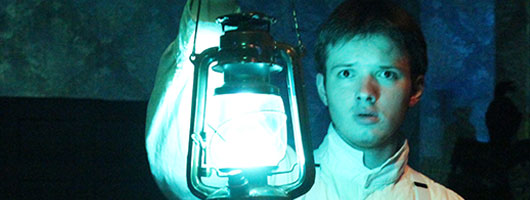 Pictured | Patrick Watterson | Theatre | La Porte, Indiana (hometown)
Pictured | Patrick Watterson | Theatre | La Porte, Indiana (hometown)
(Theatre and Dance production of A Christmas Carol)
About the Bachelor of Fine Arts in Theatre, Concentration in Performance
The Bachelor of Fine Arts (B.F.A.) degree in Theatre is designed to prepare students for the professional theatre or additional training at the graduate level. A B.F.A. degree features an intense focus on a selected area of concentration (performance, dance, musical theatre performance or design and technical production). This concentration in performance features a strong focus on the essential skills of the actor as they relate to the field of theatre performance and beyond in order to educate a well-rounded theatre performer and practitioner.
Academic Advising
College policy on advising requires that students meet with their academic advisors at least once each year, and in some departments, prior to each semester’s to enrollment. Advising holds are placed on all Ernestine M. Raclin School of the Arts students prior to advance registration and are released following advising appointments. Students with a declared major are advised in their academic units. To determine who your advisor is and how to contact them, see One.IU.
Degree Requirements (125 cr.)
Degree Map >>
Students receiving the Bachelor of Fine Arts in Theatre, concentration in Performance degree must complete 125 total credit hours including:
- IU South Bend Campuswide General Education Curriculum (36 cr.)
- Major Requirements (78 cr.)
- Free Electives (11 cr.)
- A minimum of 30 credit hours at the 300- 0r 400- level.
- Successful participation in major season productions each semester as directed by the Practicum Instructor in coordination with the Chair of the Theatre and Dance Department.
Theatre Upper-Divisional Review
All students are considered pre-Bachelor of Arts and pre-Bachelor of Fine Arts students until they pass an upper-divisional review.
Students are expected to successfully complete this review at the earliest possible point in their academic careers. Once students earn between 50 and 60 credit hours they are scheduled for their upper-divisional review, which must be undertaken at this time.
For further questions about this review process, please see academic advisor
Students undertaking this review are expected to perform the following:
- Performance concentration students present two contrasting monologues representing their understanding of acting performance and the audition process. Please include a copy of your resume and headshot for each faculty member at the review.
- All students will participate in an interview.
- The audition should show breadth (work in all the areas that a student has studied) and quality (a careful selection of the best work in the student’s area of concentration). The faculty expects to see work that demonstrates ability and improvement.
The faculty expects students to present their work in good condition and in a manner that expresses their personal development, course of study, or academic goals. For the interview, students are expected to have outlined their achievements so far and goals for the future, as well as to address any faculty questions. - At the conclusion of the review, the faculty may choose to accept a student into the appropriate degree programs, Bachelor of Arts or Bachelor of Fine Arts with, or without, provisions outlined by the faculty. The faculty may also decide to rehear students if work in some areas requires improvement. In certain cases, the faculty may decline to accept a student into the degree programs, if the quality of either their classroom or studio work is deemed insufficient. A student may attempt to pass upper-divisional review only two times. Each hearing counts as one attempt; failure to meet provisions within a specified time counts as one attempt. Failure to attend a scheduled review counts as one attempt.
Major Requirements (75 cr.)
All courses are 3 cr., unless otherwise designated.
Theatre Core (31 cr.)
- THTR-T 120 Acting I: Fundamentals of Acting
- THTR-T 225 Stagecraft 1
- THTR-T 230 Costume Design and Technology I
- THTR-T 340 Directing I: Fundamentals of Directing
- THTR-T 341 Theatre Production I (1 cr.)
- THTR-T 342 Theatre Production II (1 cr.)
- THTR-T 343 Theatre Production III (1 cr.)
- THTR-T 405 Stage Management
- THTR-T 470 History of the Theatre 1
- THTR-T 471 History of the Theatre 2
- THTR-T 483 Topics in theatre and Drama
- THTR-T 485 Capstone Project (1 cr.)
Select one of the following
- THTR-T 326 Introduction to Scenic Design
- THTR-T 335 Stage Lighting Design
- THTR-T 339 Introduction to Costume Design
Theatre Performance Concentration (41 cr.)
- MUS-V 201 Voice Class (1 cr.)
- THTR-D 120 Ballet I (2 cr.)
- THTR-D 220 Ballet II (2 cr.)
- THTR-T 220 Acting II: Scene Study
- THTR-T 223 Vocal and Physical Preparation I
- THTR-T 224 Vocal and Physical Preparation II
- THTR-T 290 History and Design of Stage Makeup
- THTR-T 300 Musical Theatre Workshop
- THTR-T 320 Acting III: Shakespeare
- THTR-T 392 Theatre Internship
- THTR-T 420 Acting IV: Realism
- THTR-T 423 Acting V: Period Comedy
- THTR-T 431 On-Camera Techniques
- THTR-T 442 Directing II: Advanced Directing
- Electives from Theatre and Dance; OR Music (3 cr.)
Theatre Electives (6 cr.)
- Select any THTR course not already listed
Photo courtesy of the Ernestine M. Raclin School of the Arts